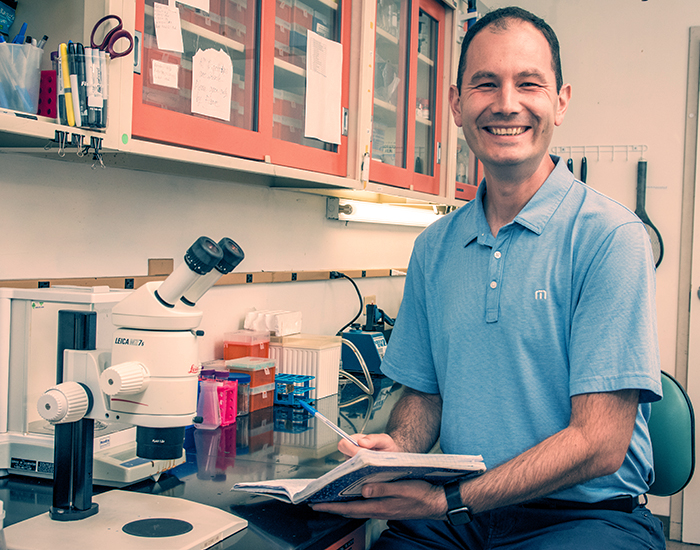This morning in a press briefing, President Trump said that chloroquine, a drug used to treat malaria and severe arthritis, was approved by the Food and Drug Administration (FDA) to be tested in humans as a COVID-19 coronavirus treatment.
As reported by the LA Times, FDA Commissioner Dr. Stephen M. Hahn said trials are necessary to determine if chloroquine and remdesivir provide effective treatment against the coronavirus and in what dosage. Chloroquine (CQ) and its related compounds are an area of expertise for KGI Associate Professor Mikhail Martchenko Shilman, who has studied the drug through his research of infectious diseases. Shilman was the senior author on a 2015 Nature Scientific Reports paper that first showed how and why CQ-related drugs work against SARS coronavirus, the most closely related pathogen to COVID-19. During the study, Shilman and the research group screened a library of 1,581 FDA-approved drugs for the ability to interfere with disparately acting pathogens. The group demonstrated that CQ and structurally-related drugs protect human cells from the viruses by targeting the host Cathepsin protein and by blocking the entry of these pathogens into the host cells, rather than by attacking the virus directly. To read the entire paper, which was also co-authored by KGI Professor Joel West, visit https://go.nature.com/3a3fhsB.
Shilman is a molecular biologist whose laboratory focuses on repurposing previously approved drugs for use as therapies against infectious diseases. Before joining KGI in 2013, he completed a BS in biology at Concordia University (Montreal), a PhD in biology at McGill University, and a postdoc under Stanley Cohen at Stanford University. He is also the co-founder of Shield Pharma, a KGI spinoff company that focuses on treatments to address bioterrorism threats.
Statement from Mikhail Shilman written today (March 19, 2020):
"The FDA decision this morning to fast-track approval chloroquine for treatment of COVID-19 coronavirus shows the potential for previously approved drugs to be deployed quickly to treat emerging infectious diseases that can rapidly infect an entire community or nation.
Chloroquine, an anti-malarial, has been safely used for 70 years around the world. The FDA has policies to encourage the repurposing existing drugs because it is quicker and lowers the risk of unexpected adverse effects. It is also a drug that is already being mass produced and is simple to manufacture, and thus can be quickly scaled up unlike complex large-molecule therapies.
Coronaviruses attack epithelial cells within the lungs. It can be life threatening because once it is inhaled, the infection inflames and swells the lungs in a way that makes it increasingly hard to breath. We thus need an orally administered drug that can be distributed in our system to reach and protect organs like lungs.
As we showed in our 2015 paper in Nature Scientific Reports, chloroquine is one of only two quinoline drugs that protects cells against certain types of viral and bacterial pathogens. It blocks the entry of these pathogens into the cell, including Ebola and SARS coronavirus, by binding to and inhibiting the function of the host Cathepsin protein, which mediates the uptake of these pathogenic agents into human cells. While we have not tested COVID-19 coronavirus, it is believed to work the same way as SARS and MERS coronaviruses.
Of the two drugs, chloroquine is the weaker of the two, better tolerated and better suited for treatment for the several weeks necessary for the body’s immune system to clear a virus such as COVID-19. The other drug, amodiaquine, is much stronger and better for immediate threats but has the potential for side effects if taken for longer periods; that is why I’ve been working to develop amodiaquine for inhaled anthrax, which kills the majority of patients in a matter of days.
Recent research has shown that chloroquine is effective against COVID-19 samples in the lab. Bayer said today they are donating three million chloroquine tablets for use as a COVID-19 treatment. Given the urgency of the pandemic and the proven safety of this drug, it is now appropriate to test chloroquine as a way to protect or treat high-risk populations."
